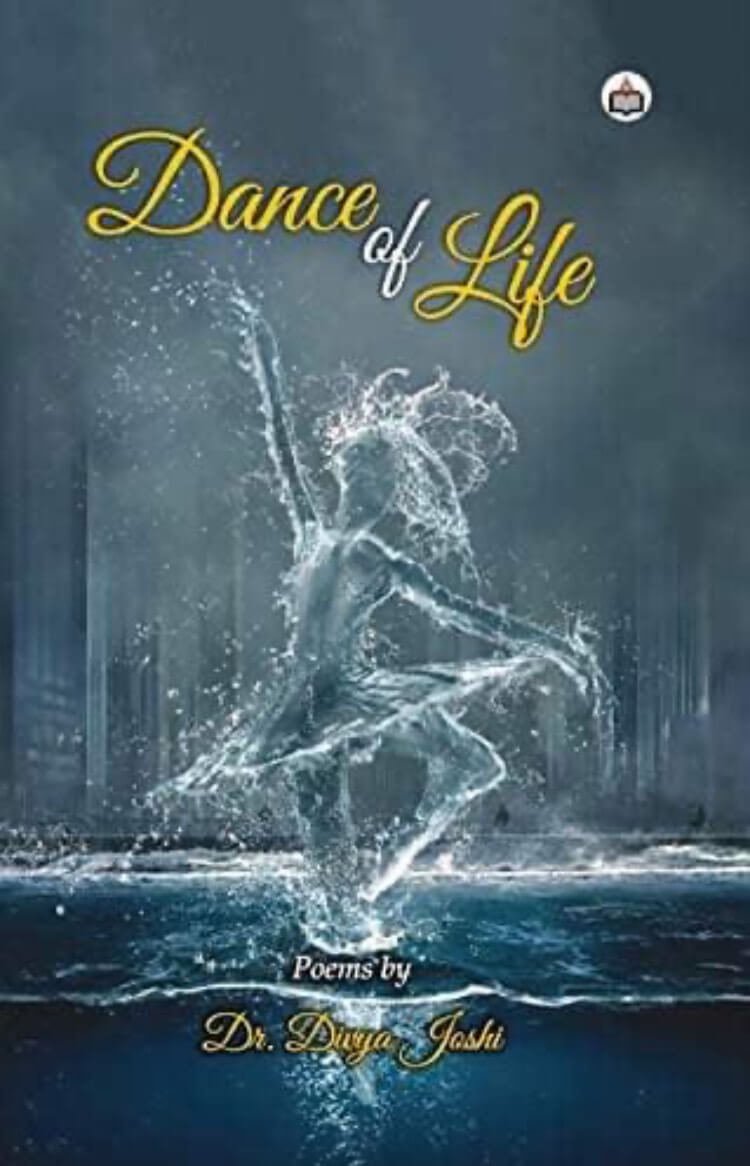Dr. Alka reviews Dance of Life, by Dr. Dvya Joshi, exclusively for Different Truths.
Book: Dance of Life

Writer: Dr Divya Joshi
Genre: Poetry
The collection of poems entitled Dance of Life reflects the inner mystery of women and it can be categorised as feminist writing. The poet herself has dedicated this collection to “women of fortitude and ingenuity”.
This book contains 44 poems. The poet has presented every facet of woman. The poem presents the woman as embodiment of the forms of energy manifested by Parvati, Shakuntala, Kunti, Sita, Kausalya, and Yashoda. It is written in our scriptures:
“यत्र नार्यस्तु पूज्यन्ते रमन्ते तत्र देवता: ।
यत्रैतास्तु न पूज्यन्ते सर्वास्तत्राफला: क्रिया: ।” (मनुस्मृति)
It means “where women are honoured, divinity blossoms there, and wherever women are dishonoured, all action no matter how noble it may be, remains unfruitful”.
A Woman’s Life
But the reality of a woman’s life is totally different from this Sloka. In reality, a woman is not allowed to live her life according to her will. The poet talks about various aspects of a woman’s life. After reading this collection of poems many mysteries of woman’s psychology can be understood.
The first poem of the collection entitled Touch reveals the inner urges and divine dreams of a woman.
The first poem of the collection entitled Touch reveals the inner urges and divine dreams of a woman. She is intimidated by this patriarchal system. The poem Missing describes the missing identity of a woman. She wishes to possess it again. An effective and pictorial description of a woman who is anxious and searching for something everywhere in the house. But she finds that it was missing for the last twenty-two years.
Another poem in the collection entitled Memories presents a woman who wants to have memory like a sieve so that she can forget all her agonies and grief and can only remember happy memories but in the concluding part of this poem poet wishes
“Wish I could cease
tossing between remembering and forgetting
and tame the woman in me”
Harsh Reality
The poem Whose Fault? brings a big question mark on the harsh reality of present life. In today’s time girls are not safe, they are pestered in moving buses and public places. Even in the house they are not safe. Here the question arises who is responsible for this situation. The answer to the question given in the poem poses another big question for all of us whether it is the woman whose fault is this:
“When you were in my womb
you survived on my nutrition and oxygen
I was eternalised as your mother
it was my fault?”
There are other poems in the collection, which talks about the motherly role of a woman.
There are other poems in the collection, which talks about the motherly role of a woman. The poem Emancipation is about the motherly experience of a woman. Another poem that describes the experience of a mother is To My Son. Here a mother teaches her son:
“Always be attentive to a woman’s need
and don’t be swayed away by the tide of arrogant patriarchy”.
The mother in the poem prays for the divine nature of her son. The poem reflects the feelings of every woman in general. In our culture we see that a mother always tries to guide her children on the right path. The success and achievement of a child is associated with his bringing up. It is also believed that the blessings of a mother never go in vain. Here in this poem the mother prays:
“My son I just pray
you stay divine and complete me!”
Women in India
This collection mainly describes the condition of women in Indian society. Poems like Bindi, Dupatta present these Indian symbols in different perspectives. By using bindi, a woman is “concealing her wisdom”. The poem Dupatta is a satire on the filthy mind of people who don’t respect a woman. They should realise:
“The dupatta that protected them
from cold and sun
mothers are never vulnerable.”
Women in Indian society are marginalised and oppressed for centuries.
Women in Indian society are marginalised and oppressed for centuries. Even though we all talk a lot about women’s rights, to change the system and mentality is not possible in a day. A woman never tries to protest for her rights because she is brought up in Indian society in a way that she is told from her childhood that she must cope-up with this patriarchal society. She regards this as her destiny. And she accepts this patriarchal system without a voice of protest. This collection is a clarion call for all those women who are suppressed and not able to raise voice for their rights.
Photo sourced by the reviewer





 By
By
 By
By
 By
By
 By
By